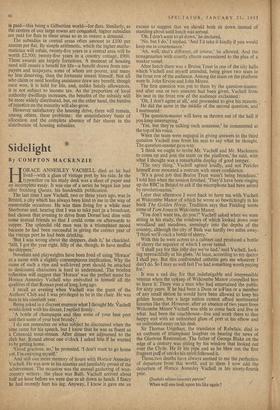Sidelight
excuse to suggest that we should both sit down instead of standing about until lunch was served.
'Oh, I don't want to sit down,' he declared.
'No, but I do,' I replied. 'And I'd take it kindly if you would keep me in countenance.' `Ah, well,, that's different,' of course,' he allowed. And the nonagenarian with courtly charm surrendered to the plea of a weaker vessel.
After lunch there was a Brains Trust in one of the city halls which Vachell and myself attended, being given two seats in the front row of the audience. Among the.team on the platform were St. John Ervine and John Moore.
The first question was put to them by the question-master. and after one or two answers had been given, Vachell from his seat in the front row of the audience exclaimed : 'Oh, I don't agree at all,' and proceeded to give his reasons. He did the same in the middle of the second question, and I murmured : `The question-master will have us thrown out of the hall if you keep interrupting.'
'Yes, but they're talking such nonsense,' he commented at the top of his voice.
When the team were engaged in giving answers to the third question Vachell rose from his seat to say what he thought. The question-master gave way.
'I think we ought to invite Mr. Vachell and Mr. Mackenzie to come up and join the team on the platform,' he said, with what I thought was a remarkable display of good temper. `The very thing,' Vachell agreed loudly, and not Pericles himself ever mounted a rostrum with more confidence.
`It's a good job that Brains Trust wasn't being broadcast.' I told him when the session finished. 'They'd have been ringing up the BBC in Bristol to ask if the microphone had been seized by revolutionaries.'
Later that afternoon I went back to have tea with Vachell at Widcombe Manor of which he wrote so bewitchingly in his book The Golden Horse. Tradition says that Fielding wrote some of Torn Jones in Widcombe Manor.
`You don't want tea, do you?' Vachell asked when we were sitting in his study, the windows of which looked down over woodland and meadows, seemingly into the depths of the country, although the city of Bath was hardly two miles away. `I think we'll crack a bottle of sherry' With this he went across to a cabinet and produced a bottle of sherry the superior of which I never taSted.
'I shall pay for this jolly day we've had,' said Vachell, look- ing reproachfully at his glass. At least, according to my doctor I shall pay. But this confounded arthritis gets me whatever I don't do. So I may as well feel I've had something worth paying for.'
It was a sad day for that indefatigable and irrepressible veteran when the upkeep of Widcombe Manor compelled him to leave it: There was a man who had entertained the public for sixty years. If he had been a Dane or a•Finn or a member of any small nation he would have been allowed to keep his golden house, but a large nation cannot afford sentimental luxuries like that. However, after an absence of two years from Widcombe Manor Vachell was able to come back and live in what had been the coachhouse—live and work there to that happy end with an unfinished glass of port at his elbow and an unfinished essay on his desk.
Sir Thomas Urquhart, the translator of Rabelais. died in an outburst of triumphant laughter on hearing the news of the Glorious Restoration. The father of George Blake on the edge of a century was sitting by his window that looked out over the Clyde. He lit his pipe and as he blew out the first fragrant puff of smoke his spirit followed it. Those-two deaths have always seemed to me the perfection of departure from this world, and to them I now add the departure of Horace Annesley Vachell in his ninety-fourth year.


































 Previous page
Previous page